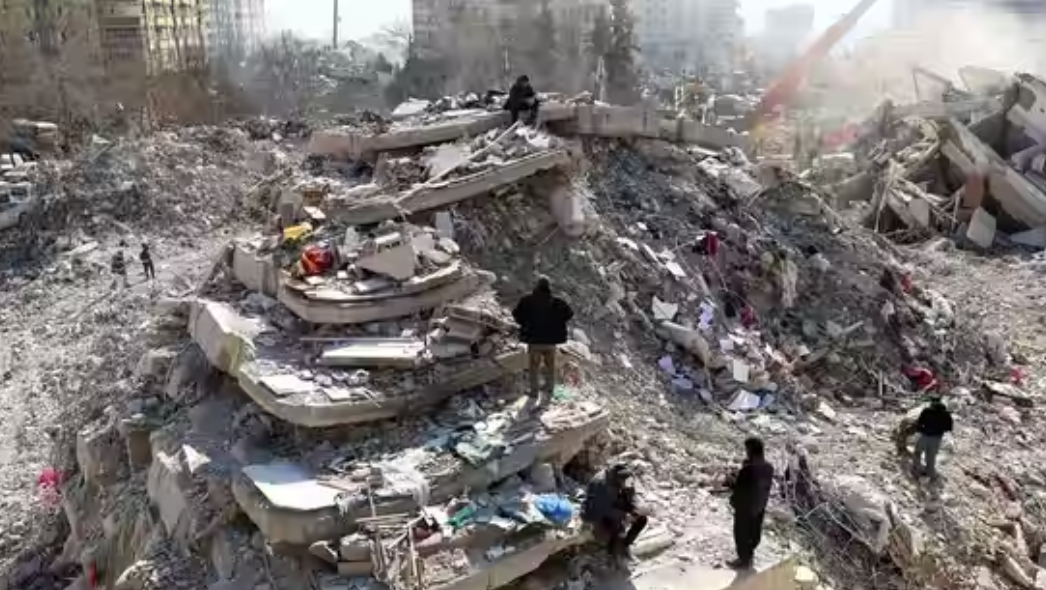« Two decades of autocratic rule have both augmented the devastation by Turkey’s earthquake and weakened the government’s response to it. » Sam Van Der Staak reports in Euobserver on February 16, 2023.
While the EU rushes to provide emergency and reconstruction support, it should question Turkey’s autocratic credentials as the cause for this failure.
In 1755, a magnitude 7.7 earthquake struck the city of Lisbon, killing nearly 40,000 of its 275,000 inhabitants, and destroying most of the city. The disaster also upset Portuguese politics and unravelled its global empire, by diverting colonial resources to rebuild the city.
Among Europe’s intellectuals, the tragedy ushered in enlightenment ideas of a just world created by humankind instead of God. The aftermath of last week’s earthquake in Turkey could prompt similar questions to autocratic leaders, claiming they are somehow better than democracies at « getting things done ».
One week after Turkey’s earthquake left more than 30,000 people dead, hope of survival has been replaced by public anger. For two decades, Turkey’s government has failed to enforce its own construction requirements, resulting in catastrophic building collapses.
In the earthquake’s aftermath, it has responded painstakingly slowly with relief efforts and has at times blocked essential civic information, notably by imposing a 12-hour blackout on Twitter. Citizens have become so frustrated that Austrian and German emergency workers were forced to suspend rescue efforts for fear of public violence.
Turkey’s failure to prepare for and respond to earthquakes raises the question of whether its increasingly autocratic leadership is to blame. During his 20 years at the helm, president Recep Tayyip Erdoğan has amassed powers, silenced critics, and taken over independent media, with devastating effects.
He has been blamed for Turkey’s disastrous economic record, its involvement in neighbouring wars, and a corrupt system of government that literally kills. His government’s lack of accountability, moreover, offers no hope of learning from the disaster.
Not long ago, strongmen such as Erdoğan, China’s Xi Jinping and Russia’s Vladimir Putin were seen as the better problem solvers, unhindered by the slow compromises of democratic politics. Their quick decision-making powers and full control of government allegedly offered a better response to natural disasters, public health emergencies, and longer-term climate and security threats.
Strong men prove weak
But in a time of global health, security, financial, environmental and energy crises, the appeal of autocratic leadership has lost much of its glow. China’s failed zero-Covid policy and Putin’s backfiring invasion of Ukraine are the clearest mishaps of autocratic rule.
So is Sri Lanka’s economic collapse, caused by its dynastic and corrupt president Gotabaya Rajapaksa. As is the failure of Lebanon’s corrupt clique to get to grips with the 2020 Port of Beirut explosion.
In even worse cases of autocratic mismanagement, Afghanistan’s Taliban and Syria’s Bashar al-Assad have refused outside help altogether in the face of mass starvation.
Some critics retort that autocrats deal better with security crises. They point at the successes of El Salvador’s president Nayib Bukele to suppress youth gangs, of Filipino former president Rodrigo Duterte to combat drug trade, and of Mali’s military government to fight jihadists. Each has sacrificed democracy to enable a security quick fix.
However, such human rights violations leave deep scars in society and ultimately backfire. A recent study found that 71 percent of violent extremists in Africa had radicalised after suffering human rights abuses by their government.
These cases suggest that democracies struggle to convince citizens of their positive value. The EU and its member states should point out how democracy has allowed them to weather the Covid-19 crisis better than dictatorships; that democratic activism at home has made the EU a green leader abroad, contributing far more than China to fight the global climate crisis; that since the start of Russia’s war in Ukraine the EU has acted in unity, without falling for the alleged inertia to which autocrats like Putin once said democracies would succumb; and that while doing so, the EU has simultaneously stood strong in the midst of a security, energy and inflation crisis, without trampling on the rights of its citizens.
In short, the EU needs a new democracy narrative.
That narrative should explain how democracy manages crises better than autocracies because of the free flow of information, the power to adjust policy errors through open debate, and the ability to replace leaders that fail. This message should ring clear as the EU offers support to Turkey’s people.
It should, however, do so humbly, acknowledging that its own democracies are not perfect and being mindful not to politicise humanitarian aid. Crises have historically been an opportunity to press for more accountable leadership. The EU should seize it.

